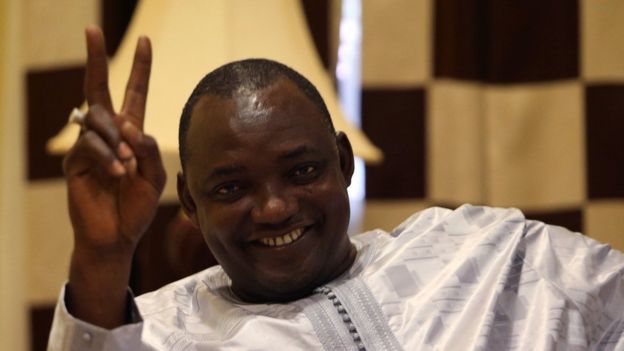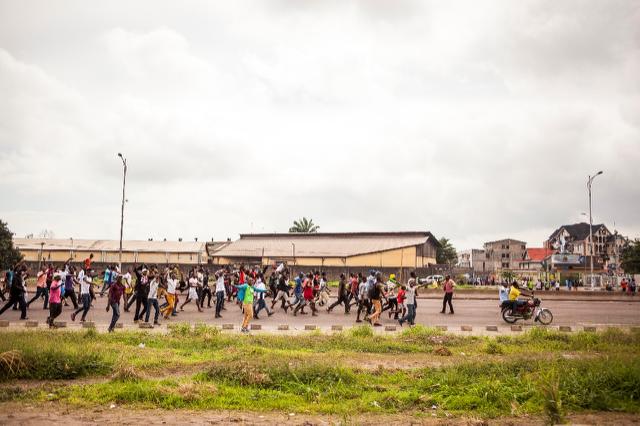No deal reached for Gambia impasse
Banjul (Gambia) (AFP) - Liberia's president said Tuesday no deal has yet been reached by a heavyweight delegation for Yahya Jammeh to transition power to opposition leader Adama Barrow, who was declared the victor of a recent presidential election.
A day of talks with Jammeh and Barrow yielded constructive conversations but no resolution.
The situation was further complicated by Jammeh's political party filing a legal challenge to the result in the afternoon.
"We come to help Gambians find their way through a transition. That's not something that can happen in one day. It's something that one has to work on," said Liberia's Ellen Johnson Sirleaf, acting as the head of a delegation of four West African heads of state visiting the country.
Nigeria's President Muhammadu Buhari, Sierra Leone's Ernest Bai Koroma and Ghana's outgoing President John Mahama all flew in with Sirleaf in an attempt to find common ground between the two sides.
The Liberian leader said Jammeh had "expressed some concerns" on the same day his party filed the petition with the country's Supreme Court.
"The ECOWAS mission was here to meet with him to understand the status quo a bit better," Sirleaf added, referring to a West African regional bloc.
The ECOWAS community would now consider the results of the visit on Saturday, she said.
Nigeria's Buhari had said earlier the longtime ruler had been "receptive" to their pleas, but president-elect Barrow said the talks were in gridlock.
"There has not been an agreement so far," said Barrow, who also met the delegation.
The leader of the opposition described a "standoff" with the government. Referring to the court challenge filed by the ruling party, he said Jammeh "doesn't have the authority" to annul the result.
The lack of a deal will come as a blow to the opposition, who had hoped Jammeh would leave power within a month under international pressure.
That transition will be all the more complicated given the legal petition, seen by AFP, claimed the country's Independent Electoral Commission (IEC) had violated the law, that Barrow was not the elected president and the result was void.
The ruling Alliance for Patriotic Reorientation and Construction (APRC) said it was not present when the IEC issued a recount on December 5, claimed there were irregularities in the process and alleged voter intimidation.
- Sanctions threat? -
A top ECOWAS official had said that if Jammeh and the delegation do not reach an agreement, West African states would "contemplate more draconian decisions", but the quartet would not elaborate on this Tuesday.
Jammeh had surprised observers by initially conceding defeat in the poll but then reversed his stand last Friday, triggering an avalanche of international condemnation and a multitude of calls for him to cede power peacefully.
His decision was triggered in part by a readjustment of the votes counted in the election was made by the IEC on Monday last week, reducing the number of ballots for all three candidates but ultimately confirming Barrow's victory.
Earlier on Tuesday, police locked down the offices of the electoral commission, raising fresh fears Jammeh might not leave office without a fight.
The electoral commission chairman, Alieu Momar Njie, told AFP that when he went to work riot police prevented him from entering the premises.
Later Tuesday Njie maintained the results still stood, and questioned Jammeh's ability to bring a legal challenge.
Jammeh in mid-2015 dismissed a string of Supreme Court judges after criticising the court's move to commute several death sentences.
"The only recourse when you have any problems with the results of the elections, one has to appeal to the Supreme Court, and the Supreme Court has been dormant since May 2015," Njie said.
A group of the country's most influential lawyers has said there is "no legitimate legal mechanism available in The Gambia to hear and determine the election petition", as Jammeh would have to stuff the court with his own appointees.
- Army loyalty -
Earlier in the day, opposition coalition members had been more confident of a breakthrough.
"Remember President Buhari is from the military. Jammeh is from the military. I think that will make a difference," said Hamat Bah, a senior coalition official.





